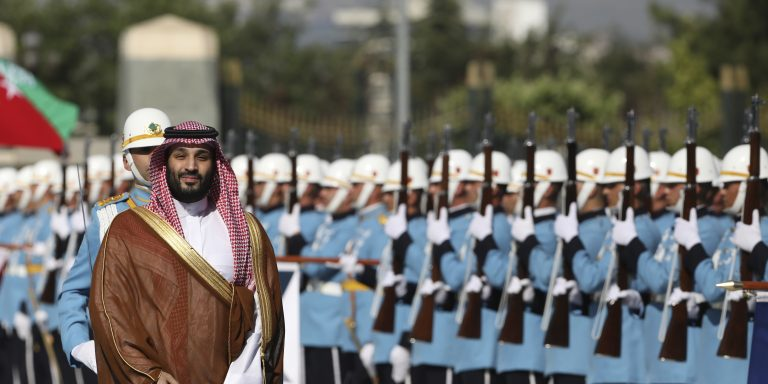
The Crown Prince and de-facto leader of Saudi Arabia, Mohammad bin Salman (MBS), visited key regional countries ahead of the planned July 16 regional summit with President Biden.
MBS’s visit to Egypt and Jordan, both key allies of the Kingdom, as well as to rival Turkey (Türkiye), sought to coordinate regional stances ahead of the Biden visit.
The regional tour indicates that the 2018 killing of Saudi journalist Jamal Khashoggi is no longer a major impediment to MBS’ regional relations.
Economic issues were key agenda items on the MBS tour, but only a few concrete agreements were announced.
In late June, MBS conducted a regional tour in an attempt to burnish his leadership credentials in advance of U.S. President Biden’s July 16 visit to the Kingdom. MBS visited two key allies, Egypt and Jordan, both of which seek financial support and additional investment from the Kingdom. King Abdullah II of Jordan and President Abdel Fattah el-Sisi of Egypt, will join President Biden and leaders of the Gulf states including the Prime Minister of Iraq, Mustafa al-Kadhimi, at the July 16 summit in Jeddah. In addition to showcasing his regional influence, MBS reportedly hoped to strengthen his summit leverage by coordinating regional positions on key issues that likely will be discussed with the United States, including a broad regional alliance to counter the growing strategic capabilities and influence of Iran, resolving the war in Yemen, efforts to revive peace talks between Israel and Palestine, and energy prices. President Biden will no doubt look to persuade the Kingdom and other exporters to add crude oil and natural gas supplies to the global market, the latter of which is expected to be in short supply in Europe this coming winter. Some European Union (EU) countries reported in June that Russia’s state-owned gas conglomerate, Gazprom, had cut gas exports to them by 60% – a clear retaliation for European military support for Ukraine. U.S. officials are also likely to highlight human rights issues at the regional summit.
On his regional tour, MBS received particularly warm welcomes in Jordan and in Egypt – both allies of the Kingdom, despite having had occasional differences in the past. King Abdullah and President Sisi have largely avoided discussing MBS’ role in the October 2018 murder and dismemberment of Jamal Khashoggi at the Saudi consulate in Istanbul. Both support MBS’ efforts to counter Iran through a network of alliances, including the longstanding partnership with the United States as well as emerging regional alliances. A day after MBS left Amman, King Abdullah stated: “I would be one of the first people that would endorse a Middle East NATO” – a statement suggesting that MBS, his regional allies, and Israel are discussing joint defense arrangements that would reduce their reliance on a U.S. security umbrella. The Jordan visit also enabled the two kingdoms to settle recent tensions over perceived Saudi support for King Abdullah’s half-brother, Hamzah, who has openly expressed disloyalty to Abdullah. As host to two million Palestinians registered as refugees, Jordan also aims to keep the Arab world focused on resolving the Israeli-Palestinian dispute, but Saudi Arabia and several Gulf states have built ties to Israel without demanding any significant concessions from Jerusalem. Egypt has been a committed ally and staunch supporter of the Kingdom in recent years. Egyptian forces joined the Saudi-led Arab coalition fighting the Iran-backed Houthi rebels in Yemen, and Egypt has backed the Saudi decision to support a Yemen truce that began in April and has been extended until at least early August.
At the same time, both Egypt and Jordan look to MBS to provide investment and budgetary support. The signing of nearly $8 billion worth of investment deals appeared to meet Egypt’s expectations for the MBS visit. Jordan, which has no significant oil or gas resources, has sought additional financial support, as well as the implementation of a previous Saudi commitment of roughly $3 billion in investments. No major Saudi donations or Saudi government-directed investment deals were announced during the MBS stop in Amman. However, on the sidelines of the visit, Jordanian and Saudi companies in the mining, construction, atomic energy, imports and exports, and other sectors signed cooperation deals.
The last country on MBS’ tour, Turkey (Türkiye), was the most closely watched stop, even though Turkey’s President Recep Tayyip Erdogan will not attend the regional summit. Yet, the stop signaled that MBS has, in the view of regional leaders, emerged from the cloud of the Khashoggi killing. Erdogan’s need for Saudi economic support amid a nearly 70% inflation rate that will no doubt affect his re-election campaign next year, outweighed Erdogan’s interest in using the killing to discredit Saudi policies that oppose regional Islamist movements and largely ignore the Israeli-Palestinian dispute. In addition to sidestepping his criticisms of these Saudi policies during MBS’ visit, Erdogan signaled a willingness to join a regional axis to counter Iran’s influence and strategic capabilities in the Middle East. In the days before MBS’ arrival, there were reports that Iran had been planning operations to assassinate Israelis visiting Turkey. At the June 24 conclusion of the visit, MBS appeared to recommit to economic support discussed during Erdogan’s visit to the Kingdom in late April. A joint statement issued following the leaders’ talks detailed a new period of bilateral ties, including the removal of trade restrictions – a reference to an informal Saudi boycott of imports of Turkish goods, begun in November 2021 – more scheduled talks, and a possible currency swap. At a trade conference held in Ankara to coincide with the MBS visit, a senior Saudi official said that the Kingdom has decided to lift the trade embargo. Even with only modest agreements announced, the visit to Turkey significantly improved MBS’ regional image in advance of the summit with President Biden in July.
